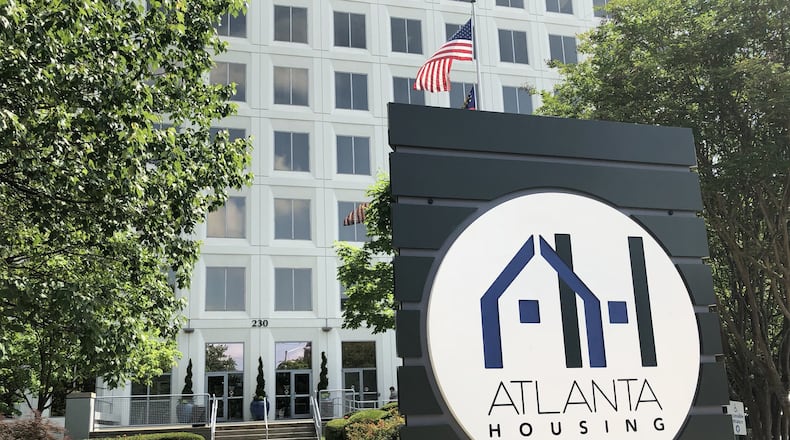The fight over the high-priced legal bills of former Atlanta Housing Authority CEO Renee Glover appears to be at an impasse. Meanwhile, the lawyers’ clocks keep ticking and taxpayers remain on the hook.
Glover, who at one time was the highest paid housing authority executive in the U.S., left AHA nearly six years ago after drawing the ire of then-Mayor Kasim Reed over her employment contract. That bad blood later spawned lawsuits that have so far racked up hundreds of thousands of dollars in legal bills. Critics say the the ongoing feud has also distracted the housing authority from its mission of providing affordable housing amid a rapid increase in Atlanta housing costs.
In an interview with The Atlanta Journal-Constitution and Channel 2 Action News, Glover and her attorney, William B. Hill Jr., say the two sides reached a preliminary agreement in recent months to end the costly dispute. But Hill said Glover withdrew last month from the potential settlement after the housing agency’s board failed to vote to approve the deal.
“Without exaggeration this has just been two years of hell,” Glover said Tuesday. “In 19 years of work, there’s been this malicious, false attempt to destroy me personally, financially and from a reputational standpoint.”
The impasse is the latest in a nasty legal battle that flared up in 2017 under Reed, who in his final months in office pushed AHA to sue companies affiliated with local developer Egbert Perry. Then in his final weeks as mayor in December 2017, Reed directed the city to file a separate suit against Perry and Glover seeking at least $100 million in damages.
The lawsuits revolved around allegations Perry and Glover entered a backroom real estate deal that gave away a large portion of housing authority land at a steep discount. Perry and Glover have said the city misrepresented the terms and the suits were an attempt to destroy their respective reputations.
A judge dismissed the AHA lawsuit against Perry's companies. And in April 2018, the city withdrew its lawsuit against Perry and Glover. Perry's companies have since counter-sued, and that litigation is pending.
Glover sued AHA last August seeking at least $235,000 in legal fees she incurred while defending herself against the city's lawsuit. The case ultimately went into arbitration.
Hill has argued AHA is responsible for Glover’s legal fees under an indemnification clause in the severance agreement she signed when she left the agency in 2013.
The indemnification protects her against future potential litigation. It’s a common practice for governments and the private sector to offer legal protection to their leaders for actions they took in good faith.
Hill said AHA agreed to terms in December after a day-long mediation session, with parties on both sides signing a four-page, handwritten agreement. But AHA later balked, he said.
A tentative deal was struck again in January. Glover agreed to all of AHA’s additional terms, Hill said, and Glover expected a resolution as soon as that month.
A formalized agreement was drafted in February, and again Glover expected a board vote. But one didn’t come that month or in March as AHA lawyers signaled would likely happen. Glover withdrew and Hill has asked that mediation resume yet again.
“What we’ve done is wasted nine months of Ms. Glover’s time and personal finances, and we’ve wasted nine months of the public’s trust, and we’ve wasted nine months of untold public funds,” Hill said.
Glover’s legal bills are now more than $300,000, Hill said. The litigation also has hurt Glover’s reputation and cost her business opportunities, he said.
On Tuesday, a spokesman for AHA said the agency has called a special meeting of its board at 8 a.m. Wednesday to vote on the Glover settlement. The agency had previously said its insurer needed to review Glover’s claims.
But Hill informed AHA and the arbiter on March 28, after the board’s most recent meeting, that Glover wanted arbitration to continue because of the board’s failure to act.
Hill said he could not disclose terms of the proposed settlement.
Esther Panitch, a legal analyst for Channel 2, hasn’t seen the documentation, but she said it’s not clear how AHA’s board could vote to approve a settlement when one of the parties has spiked the agreement.
“It sounds like an offer has been withdrawn,” she said. “If one side offers and the other side doesn’t accept it, then no there’s not a meeting of the minds.”
Glover ran AHA from 1994 to 2013 when Reed pushed to have her removed from her job. Glover drew the wrath of Reed after the agency’s board in 2010 extended her contract for five years, beyond the end of his first term in office.
During her tenure, Glover created the Atlanta model for affordable housing that brought an end to failing and dangerous housing projects and replaced them with private-sector developed mixed-use, mixed-income housing. AHA also faced criticism for helping fuel gentrification.
But the Atlanta model has been adopted in cities across the country.
Glover's compensation has drawn less flattering attention. In 2010, she took home $644,000 in total compensation, which a national survey conducted by the U.S. Department of Housing and Urban Development showed to be the highest in the country. Soon afterward, the Obama administration imposed a salary cap limiting how much federal money could be used to pay public housing executives.
Our Reporting
In August 2018, the AJC reported on former Atlanta Housing Authority CEO Renee Glover’s lawsuit against her former employer seeking reimbursement of her legal bills, citing an indemnification clause in her separation agreement. The city of Atlanta had sued Glover and developer Egbert Perry in 2017 seeking $100 million in damages and alleging a sweetheart real estate deal. The lawsuit was later withdrawn by the city.
About the Author
Keep Reading
The Latest
Featured





